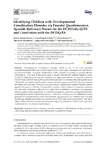Identifying children with developmental coordination disorder via parental questionnaires. Spanish reference norms for the DCDDaily-Q-ES and correlation with the DCDQ-ES

Ver/
Use este enlace para citar
http://hdl.handle.net/2183/24824
A non ser que se indique outra cousa, a licenza do ítem descríbese como Creative Commons Attribution 4.0 International License (CC-BY 4.0)
Coleccións
- Investigación (FCS) [1262]
Metadatos
Mostrar o rexistro completo do ítemTítulo
Identifying children with developmental coordination disorder via parental questionnaires. Spanish reference norms for the DCDDaily-Q-ES and correlation with the DCDQ-ESAutor(es)
Data
2020-01-15Cita bibliográfica
Montes-Montes R, Delgado-Lobete L, Pereira J, Schoemaker MM, Santos-Del-Riego S, Pousada T. dentifying children with developmental coordination disorder via parental questionnaires. Spanish reference norms for the DCDDaily-Q-ES and correlation with the DCDQ-ES. Int J Environ Res Public Health. 2020 Jan 15;17(2):555.
Resumo
[Abstract]
Developmental Coordination Disorder (DCD) is one of the most prevalent
neurodevelopmental disorders in school-aged children, with major consequences in psychosocial
and physical health. Adequate identification of this disorder is necessary to prompt effective
interventions. The aims of this study were to develop the Spanish adjusted reference norms
for the DCDDaily-Q and to test the correlation and agreement between the Spanish versions of
the DCDDaily-Q (DCDDaily-Q-ES) and the Developmental Coordination Disorder Questionnaire
(DCDQ-ES), two reliable instruments to assess motor performance and DCD. Clinically relevant
percentiles were calculated for the DCDDaily-Q-ES using a representative sample of Spanish children
aged 5 to 10 years (n = 356; M = 7.3 years, SD = 1.8; boys = 50%). Pearson’s correlation coefficient
and intraclass correlation coefficient (ICC) were used to determine correlation and agreement
between questionnaires, respectively. A moderate and significant correlation and agreement between
DCDDaily-Q-ES and DCDQ-ES was found (r = 0.406; ICC = 0.381; p < 0.001). Differences in daily
participation and performance were found between age groups, but not between boys and girls.
Spanish age-adjusted percentiles and cutoff scores for DCDDaily-Q-ES are provided. This study
offers further validation and relevant information regarding assessment of DCD and has practical
implications for clinical practice and research.
Palabras chave
Developmental coordination disorder
Assessment
DDCDaily-Q
DCDQ
Activities of daily living
Daily participation
Daily performance
Occupational therapy
Assessment
DDCDaily-Q
DCDQ
Activities of daily living
Daily participation
Daily performance
Occupational therapy
Versión do editor
Dereitos
Creative Commons Attribution 4.0 International License (CC-BY 4.0)
ISSN
3195-2254






